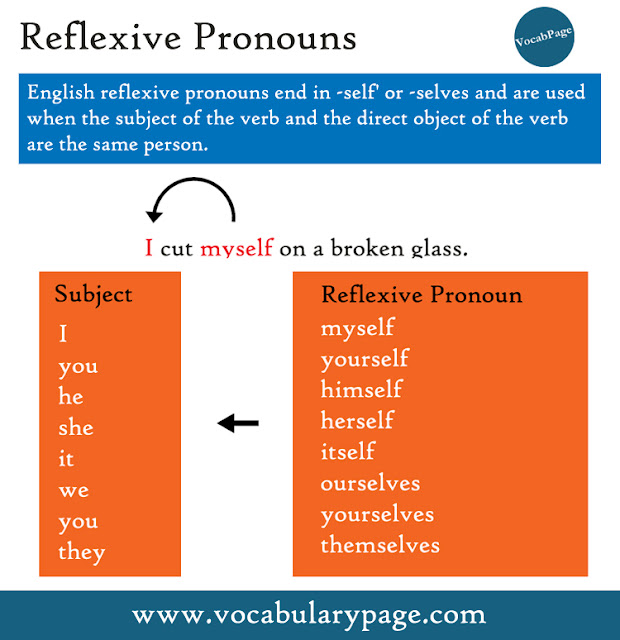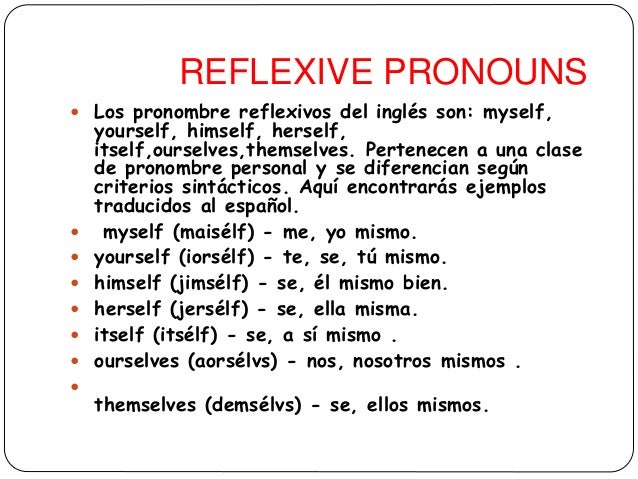
The ability of you to delude yourself may be an important survival tool.Never express yourself more clearly than you are able to think.The ability to delude yourself may be an important survival tool.Note: Sometimes, the subject can be implied. If history repeats itself, and the unexpected always happens, how incapable must man be of learning from experience.If the world should blow itself up, the last audible voice would be that of an expert saying it can't be done.We forfeit three-fourths of ourselves in order to be like other people.Here are some real examples of reflexive pronouns: However, sometimes people (or things) do things to themselves, and this is when you can use myself, yourself, herself, himself, itself, ourselves, yourselves, and themselves as reflexive pronouns. In most sentences, somebody does something to someone else. (Note: The subject is known as the antecedent of the reflexive pronoun.) We often ask ourselves why we left London.( The members argued amongst the members.) The members argued amongst themselves for an hour.Using a reflexive pronoun means you do not have to repeat the subject (shown here in bold). Real-Life Examples of Reflexive Pronounsīelow are some examples of reflexive pronouns.(The original text above is an example of this same principle being applied to excess.) Works Citedĭr. In short, the reflexive pronoun, when used in this way instead of the “proper usage” as explained above, directs the sentence’s emphasis and therefore the reader’s focus towards the noun to which the pronoun refers, indicating that it is in some way worthy of extra attention. The usage above, with the reflexive pronoun included, implies that there is something unusual or notable about that particular individual being involved. The Grinch himself carved the roast beast!

Thus the reflexive is being used for emphasis only it is understood that this sentence: We can tell this is how it is being used because, as you can see, the object and the subject of the verb are very definitely not the same. Seuss, shows the reflexive pronoun in its use as emphasis. This sentence, from the popular children’s book How the Grinch Stole Christmas by Dr. A well-known example follows:Īnd he-he himself-the Grinch carved the roast beast! There is, however, one way in which the reflexive pronoun may be used that does not fit into that structure: It can be used to emphasize any noun or pronoun directly preceding it. Exceptionįollowing the rule stated at the top of this article will steer you right the vast majority of the time. In this case, the subject is second-person (“you”), and the object is first-person (“ myself”), so they can’t be referring to the same individual. The phrase “email myself” cannot be used in this context, because the only person who can “email myself”is “ I.” Remember, we only need the reflexive if the subject and the object of the verb are both the same. For instance:įreeing the pronoun from the detritus of the rest of the verb’s object makes the problem much clearer. A good way to determine whether you need to use the reflexive pronoun is to apply the same trick that is usually used to check whether your pronouns should be nominative or accusative break the sentence down. The meaning is the same either way, but the first is recognized as incorrect and should be avoided. Note that the reflexive pronoun has been replaced with the first person accusative pronoun. There is no need for a reflexive pronoun here, as the person doing the emailing (“you”) is not the same as the person being emailed. If you have questions, email Bob or myself. Though this does not necessarily impair meaning, it is considered incorrect. Improper UsageĪ grammatical error that is somewhat common among developing writers is the use of reflexive pronouns when they are not needed, usually in an attempt to appear more formal. Most English speakers would read this sentence as meaning Jane was shaking someone else, which suggests a different situation entirely. However, if we were to replace the reflexive pronoun with the standard accusative pronoun “her,” the meaning changes: Jane was drifting to sleep at a time when she shouldn’t be, possibly during class, so she made a sudden movement in order to stay awake.

The meaning of the sentence is fairly clear. If the object and the subject of a verb are the same, use a reflexive pronoun for the object.

The following can be considered a rule with regards to reflexive pronouns: In English, these are the pronouns that end with “self” or “selves”: e.g., “himself,” “myself,” “ourselves,” etc.
#Meaning of reflective pronoun how to
This section has information about how to use pronouns correctly.Ī reflexive pronoun is a specific type of pronoun that is used for the object of a verb when it refers to the same noun as the subject of that verb. Writing Letters of Recommendation for Students.


 0 kommentar(er)
0 kommentar(er)
